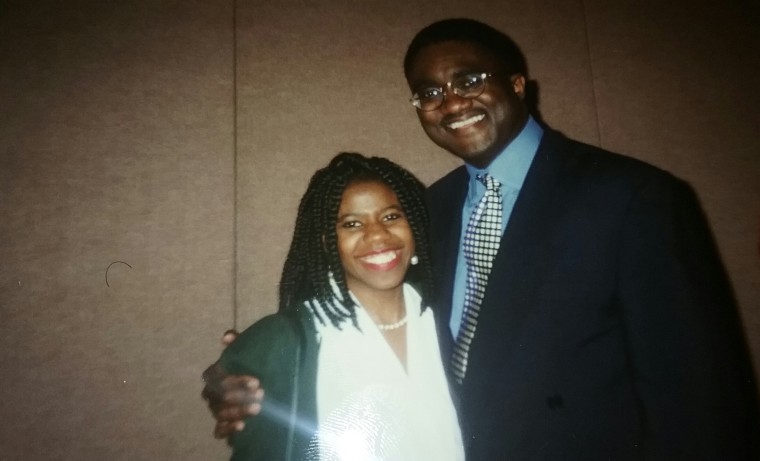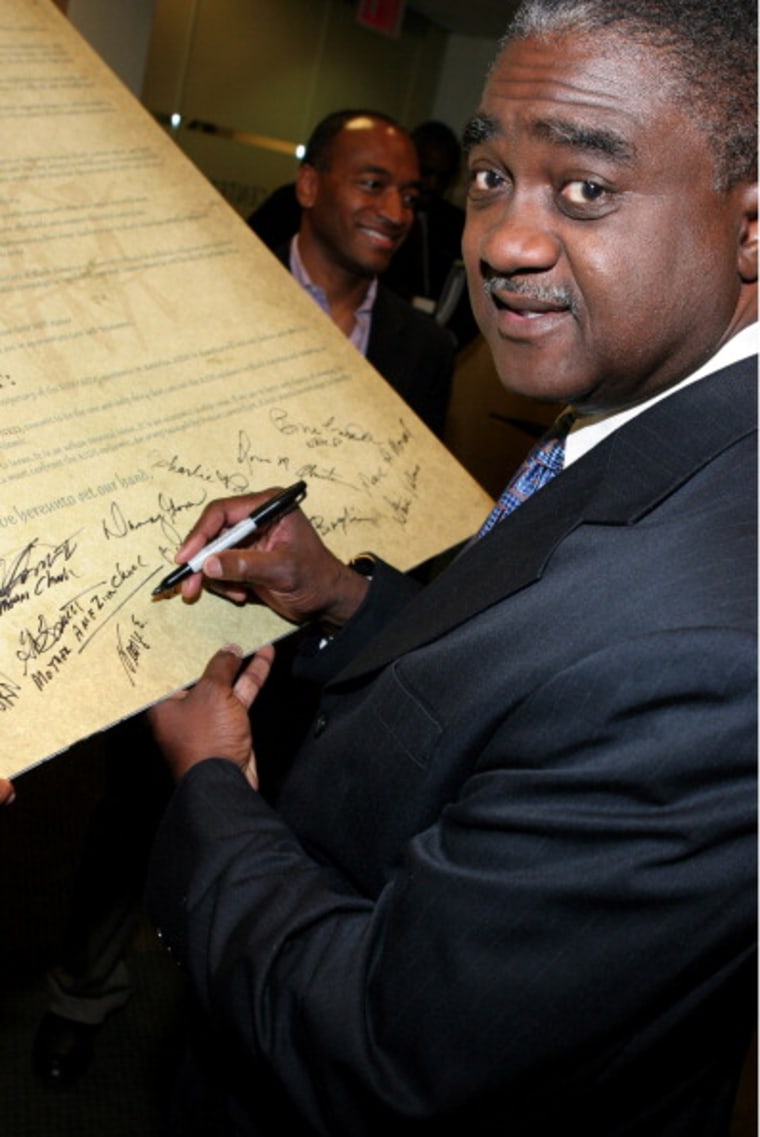Without a doubt, George Curry got the send-off he deserved.
The former Emerge magazine editor and nationally syndicated columnist died of heart failure August 20 at the age of 69.
The Weeping Mary Baptist Church in Tuscaloosa, Ala., was at capacity Saturday afternoon as family, friends, dignitaries and noted colleagues including longtime friend Les Payne, a Pulitzer Prize-winning journalist and former columnist for Newsday, bid farewell to one of the nation’s most prominent journalists.
The three-hour service was presided over by Curry’s childhood friend Charles Steele, president of the Southern Christian Leadership Council (SCLC) and included remarks from TV One host Roland Martin, journalist Ed Gordon and Kemba Smith, the young lady who was freed from jail after an Emerge magazine cover story detailed how the middle-class Hampton student got caught up in the mandatory minimum sentencing laws.
RELATED: Prominent Black Journalist, Publisher George Curry Has Died
Smith, who received a 24 and a half-year prison sentence, for conspiracy to participate in her boyfriend’s drug activities, said that to her and her family George Curry was “our hero.”
“In 1996, George made me – a nobody – the cover story,” Smith said during the funeral noting that because of the Emerge article members of the Congressional Black Caucus visited her in prison and Elaine Jones of the NAACP Legal Defense and Educational Fund took on her case pro bono.
“He shaped the woman I am today,” said Smith, who was given a presidential pardon by President Bill Clinton in 2000, three days before Christmas.
I echo Smith’s sentiments. I am where I am today because of George Curry. He changed my life.
I met George 20 years ago this year. I was a master’s student at The Ohio State University when my thesis advisor reached out to me and told me Emerge magazine editor George Curry needed research assistance on a book project about Emmett Till. My advisor thought I would be perfect for the “job.”
A native of Mississippi, my thesis was on the media portrayal of Mississippi focusing on the Civil Rights Movement. The two men who killed Till – J.W. Milam and Roy Bryant ‑ were acquitted by an all-white, all-male jury. They later confessed to the murder in Look magazine. George wanted a transcript of the trial.

I sent George the research I found and he sent me copies of Emerge. One of the first issues was the Kemba Smith story. I had grown up with Ebony/Jet, Essence and Black Enterprise. While other magazines covered music and pop culture, Emerge was a news magazine that examined social and political issues from an African American perspective.
I met George in person during the 1996 NABJ convention and in January 1997 he asked me if I would like to come work at Emerge.
I packed up my four-door silver Honda Accord and got on the road, making the 10-hour trek from Atlanta to Washington, D.C. My companions were the sounds of Tupac in the cassette deck, a party size bag of peanut M&Ms and a bottle of Sprite.
My first day at Emerge I had on the same suit as the elderly receptionist at BET, which owned the magazine. I was excited and scared. I didn’t know what to expect. But then I learned quickly what George expected of his staff.
He was a demanding taskmaster who didn’t accept excuses. He expected us to be well-read and well-informed with copies of The New York Times, The Washington Post, The Wall Street Journal and USA TODAY on our desks in the mornings. He worked hard and stayed late. He expected the same of us. During meetings he would say I’m not asking you to do anything I haven’t done or wouldn’t do.
Initially I was an assistant editor tasked with writing stories for the front-of-the-book and fact-checking feature stories. I also had the opportunity to write big pieces. Later on, I would write the magazine’s Race Matter’s column.
RELATED: My Sister's Keeper Helps HBCU Women Find Their Voices
One of my first feature stories was on the lack of resources at historically black colleges and universities (HBCUS). The title of the article was “Historically Broke Colleges.” I remember I was in the office of one of the senior editors when George came in and threw the first draft of my story on the desk. He said some not nice things about the piece. I want to say he may have used the word crap but I’m being polite – and George was not polite. He was always brutally honest.
I was shocked – and hurt. No one had ever talked to me like that before. I had gotten a full academic scholarship to Jackson State University, graduating magna cum laude and afterwards received a presidential fellowship to attend The Ohio State University. After grad school, I walked into the offices of Upscale magazine and got hired on the spot. Let’s just say I was accustomed to doing well. But George knocked me off my high horse real fast.
I thought I was a pretty good writer and was told so by former professors. “Lottie, this isn’t focused,” George told me. “This story is all over the place.”
He was right and after giving me a good talking to, George worked with me personally to shape the narrative of the story. I had done my research and had all the data and statistics about black colleges, but the story was missing the human aspect. We needed to put a face on why Black colleges were so important George explained. He put me in touch with a young man who was a former drug dealer and had become SGA (student government association) president at Knoxville College, George’s alma mater. That young man, Nadir Johnson, reached out to me two days after George died. He went on to own his own construction management company on the East Coast and now does furniture restoration in California.

Later on, I was assigned to interview the new NAACP Youth and College Director. George read the piece. He said it was boring and instructed me to do it over. Yes, I had to call and conduct the interview again. George was tough for sure. His management style wasn’t for the faint of heart. You couldn’t be thin-skinned or the overly-sensitive type. I had to grow up fast. But I realized years later, that he saw potential in the young staff that worked at Emerge. Factchecking was an important part of our jobs. He wanted us to get it right. He wanted us to be our best.
He also took up for us when he felt we were being slighted.
As part of my package on HBCUS, I had to do a four-person dialogue with prominent members of the HBCU community. One of the people scheduled to participate, a former congressman, called to cancel five minutes before our conversation. George got on the phone and the former congressman was at our offices in 20 minutes. I don’t know what George said – he may have cursed him out or may have had something on this particular individual – nevertheless, I was able to conduct the interview and complete the story.
During his remarks, Ed Gordon noted that George relished his role as a mentor.
“We are all better enriched because we knew this man,” said Gordon.
Indeed. I had the opportunity to sit at his feet and learn from his wisdom.
“What’s your next story?” George would ask.
“You have to be hungry,” he would say.
During the Friday evening service, George’s high school English teacher said her former student lived by four D’s: Drive, Determination, Discipline, Dependable. He also added dedication said Evelyn Mims, who read the poem “If” by Rudyard Kipling.
“He devoted his gifts and talents to righting wrongs, lifting as he climbed,” said Mims. “Let’s pick up the baton and carry on his legacy.”
RELATED: 'Role Model' With a 'Bright Smile', Journalist Michael Feeney, Dies at 32
Benjamin Chavis, president of the National Newspapers Publishers Association — the umbrella organization for more than 200 Black newspapers nationwide — said one word described George, “courage.”
“He had the courage to put Clarence Thomas on the cover with a handkerchief on his head,” Chavis recalled during the funeral.
The controversial covers of the Supreme Court Justice were pure Emerge and pure George. The magazine reflected the man in charge — bold, sharp, unapologetic.
Rev. Jesse Jackson Sr., who graced the cover of Emerge, spoke Friday evening during the community public viewing. Jackson described George as a freedom fighter and journalist who lived the courage of his convictions.
“He was unafraid of Jim or Crow,” said Jackson. “His mission was greater than his job.”
Rev. Al Sharpton echoed similar sentiments during his 40-minute eulogy Saturday.
George, “chose integrity” and “never compromised his dignity,” said Sharpton.
Sharpton gave a true Baptist preacher sermon noting that the Friday before George’s death, the journalist was on the last hour of the activist’s radio show talking about the upcoming presidential election.
“George Curry left us at a critical time in history,” said Sharpton. “If there was a need for a strong independent but ethical Black Press it is now.”
Emerge magazine was shut down in 2000. Before his death, George was working on Emerge News Online. His goal was to bring back Emerge in both online and print form.
In the end, Tuscaloosa’s hometown hero was honored nationwide for his accomplishments. Representatives from the 1965 class at Druid High school, alumni of Knoxville College and members of the Southern Christian Leadership Council all said their goodbyes to George. The service also included acknowledgements from the mayor and city council of Tuscaloosa, the Alabama House of Representatives and the governor’s office.
“We lost something we won’t see again,” said Sharpton, urging funeral attendees to help keep Emerge News Online. “George was part of a long tradition, but he’s one of a kind.”
Indeed.
George called me in December 2015 while I was home visiting family in Mississippi. He told me he was reviving Emerge. I had seen his GoFundMe fundraising page. I asked him how he going to do it. He mentioned starting it online first then publishing a magazine version several times a year.
Like so many veteran journalists, he was trying to figure out how to navigate the business side of this new media world. There was also more competition for the Black reader in the online space than it was 16 years ago. As my family pulled at me, I told George I was would call him back. But I didn’t. It would be the last time I talked to him.
George affectionately called me “Lottie Mae” and would often joke that he saved my life. I agree sir.